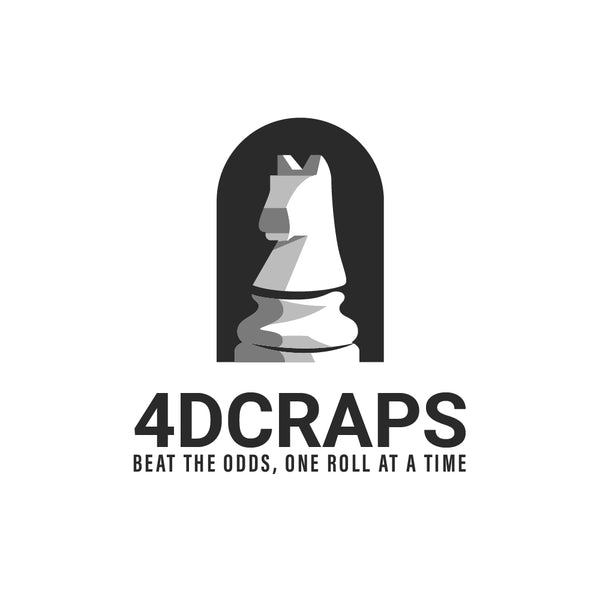How to Win at Craps: Why Hedging Your Don’t Pass Bet Is a Costly Mistake
Share
Craps is one of the most electric games in the casino — a fast-paced mix of luck, excitement, and crowd energy. But beneath the chaos lies a game of math and probabilities. And if you want to win, you have to play smart — not scared.
One of the most solid bets on the table is the Don’t Pass Line. While it goes against the grain of the typical shooter-cheering crowd, it’s actually one of the best bets in the casino, with a low house edge and clear rules.
But many players make a critical error once the point is established: they hedge their Don’t Pass bet by making a Place Bet on the very number they’re hoping won’t come. Let’s walk through this common mistake and why it’s a strategic disaster.
The Setup: $100 Don’t Pass Bet, Point is 9
You put $100 on the Don’t Pass Line.
- On the come-out roll, a 9 is rolled. That becomes the point.
- Now, to win, you want a 7 to come before another 9 is rolled.
But instead of letting it play out, the player gets nervous and decides to hedge by placing a $75 Place Bet on the 9.
Their reasoning:
- If a 7 comes, you win $100 on Don’t Pass, lose $75 on Place Bet = net +$25
- If a 9 comes, you lose $100 on Don’t Pass, win $105 on Place Bet = net +$5
It seems like a clever way to "guarantee" a small win. But it’s not — and here’s why.
Why This Is a Huge Mistake
1. You Already Cleared the Hardest Part — the Come-Out Roll
Before the point was established, your Don’t Pass bet had to survive:
- An automatic loss on 7 or 11 (8 ways to lose)
- A push on 12 (1 way — depending on the house rules)
- Only 3 ways to win outright (2 or 3)
So statistically, the come-out roll is stacked against you. But you got through it. You made it to the point. That means you’ve already done the hard part — and now you’re in a favorable position.
So why would you sabotage that advantage by placing a bet on the very number you’re hoping doesn’t roll?
It’s like surviving a storm only to walk back into the rain on purpose.
2. You’re Betting Against Yourself
You now have a bet for the 9 (Place Bet) and a bet against the 9 (Don’t Pass). This means one bet will always lose, and the other will only win a small amount. That’s not hedging — that’s spinning in circles.
3. You’re Locking in a Worse Risk/Reward Ratio
Let’s be clear:
- You’re risking $175 total ($100 on Don’t Pass, $75 on Place 9)
- Your maximum win is $25 if a 7 comes, or $5 if a 9 comes
- You’re taking real risk, with real money, for very little reward
Plus, the Place Bet on the 9 carries a much worse house edge — about 4%, compared to the 1.36% on Don’t Pass.
You're not reducing risk — you’re just increasing the house's cut of your money.
4. You’re Wasting a Good Bet to Protect a Bad One
The Don’t Pass Line is one of the few bets in the casino that gives you a fighting chance. If you want to strengthen it, the right move is to lay odds behind it, which comes with no house edge. That means you’re increasing your potential win without giving the casino a bigger slice.
By contrast, the Place Bet on 9 is a standalone losing proposition in the long run. So all you’re doing is weakening a strong position to protect a weak one. That’s backwards strategy.
The Right Move: Play It Straight and Press Your Edge
Once the point is established and you’re holding a Don’t Pass bet, you're in a favorable situation:
- The 7 is more likely to come before the point (in this case, 6 ways to roll a 7 vs. 4 ways to roll a 9)
- You’ve already survived the unfavorable come-out roll
- You’re now playing with the math on your side
If you want to press your edge, take odds behind your Don’t Pass bet. That way, you're betting more when the math favors you, instead of hedging with a high-house-edge side bet.
Final Word: Don’t Hedge a Bet That’s Already in the Money
When you place a Don’t Pass bet and get past the come-out roll, you’ve already paid the price to earn a good position. Don't throw that away by chasing the illusion of safety.
Hedging in this case is a textbook example of a short-term emotional decision that leads to long-term losses. Stay disciplined, play the strong bets, and let the math work for you.
